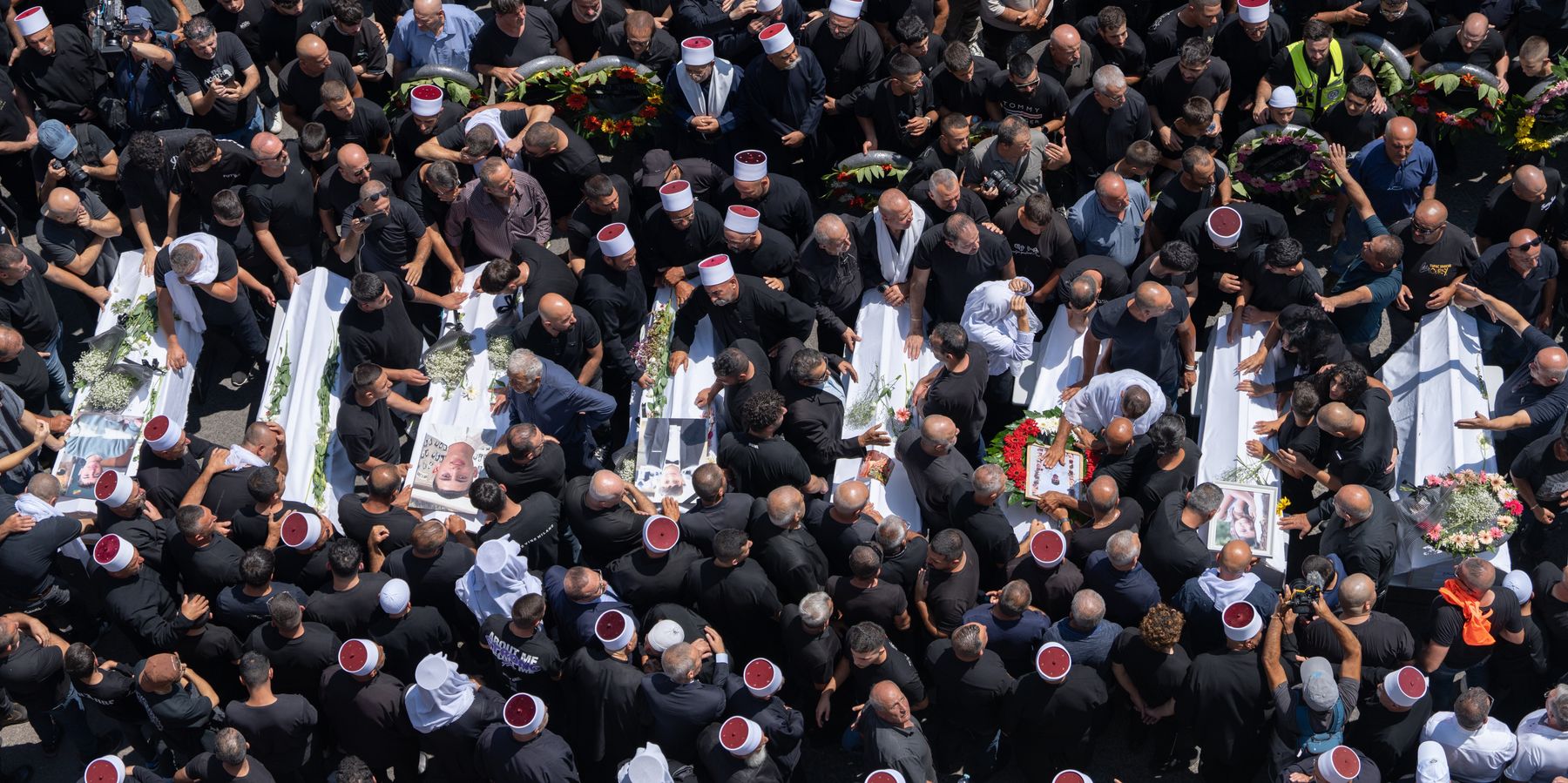A missile strike in the town of Majdal Shams in the Israeli-occupied Golan Heights has led to the death of 12 civilians and could be the match that finally blows up the tensions between Hezbollah and Israel into a full-on war.
Israel charged the Lebanese Hezbollah with responsibility for the strike, the deadliest incident on the Israeli Northern Front since the onset of the latest round of hostilities last October.
“We are able to say that it is a Falaq rocket with a 53-kilogram warhead” said the Israeli army’s chief of staff Herzi Halevi, adding “This is a Hezbollah rocket”.
Hezbollah, meanwhile, denied any involvement in the incident. Reports indicate that the militant group acknowledged it launched Falaq rockets in the area on Saturday, but at Israeli military targets and not the soccer field. According to Axios, Hezbollah officials told the UN that an Israeli rocket interceptor had struck the soccer field.
While the Golan Heights has been subject to numerous attacks by Hezbollah in the current conflict, the targeting of civilians in such a manner would mark a dramatic departure from its modus operandi.
Throughout the course of this conflict, the Shiite movement has carefully selected its targets in a way designed to keep Israeli forces stretched thin as the fighting continues in Gaza, while not giving Israel justification to launch a wider war on Lebanon.
Israel says that Hezbollah’s cross-border missile and drone attacks have led to both military and civilian fatalities. A deliberate strike targeting civilians on such a scale as Saturday's attack, however, would make little strategic sense for the Lebanese movement, since it would ostensibly give Israel justification for a full-scale war that could destroy Hezbollah and further isolate and demonize them on the international stage.
This would include having Hezbollah classified in its entirety as a terrorist organization by the EU, a goal which Israel has long sought to achieve.
In previous cases, the Lebanese movement has also not shied away from admitting to mistakenly causing civilian deaths.
In 2006, Hezbollah’s leader Sayyed Hassan Nasrallah took responsibility for the death of two Israeli Arab children, issuing an apology to the family of the victims.
Israeli ‘retaliation’
Whatever the case, Israel launched strikes deep into Lebanese territory in the immediate aftermath of the Majdal Shams incident. The Israeli military said the targets were Hezbollah weapons depots and military infrastructure. These strikes, however, did not mark a significant departure from the rules of engagement that have characterized the latest round of fighting between the two foes. The actual Israeli “retaliation” therefore has yet to take place as of this writing, and is anticipated to take the form of a much heavier operation.
The Israeli government authorized a retaliation during a meeting of Israel’s security cabinet immediately following Prime Minister Benjamin Netanyahu’s return from the United States.
Earlier Netanyahu, who cut short his visit to the U.S. in the wake of the incident, made clear that Hezbollah will pay a "heavy price" for the attack, according to a statement issued by his office. Defense Minister Yoav Gallant visited Majdal Shams and said, "We will hit the enemy hard."
These developments have sparked fears that the Majdal Shams attack may be the game-changer that will cause the situation to spiral out of control on the Lebanese-Israeli front, leading to a full-blown war that many have been warning of since October.
Lebanese Foreign Minister Abdullah Bou Habib has urged the United States to restrain Israel, warning that an attack on Lebanon could trigger a regional conflict. U.S. Secretary of State Antony Blinken meanwhile has called on the Lebanese state to rein in Hezbollah.
Importantly, the United States maintained its opposition to a full-scale war on the Lebanese-Israeli front despite joining the Israelis in holding Hezbollah responsible for what happened in Majdal Shams.
Addressing reporters in Tokyo, Blinken, while stressing Israel’s right to defend its citizens, underscored that Washington had no interest in seeing the situation escalate. This stance echoes previous warnings from American officials against escalation on the Lebanese-Israeli front.
The stakes on this front are especially high for the United States given Hezbollah’s close ties with Iran. That the Lebanese movement is by far Tehran’s closest and strongest ally, in addition to Iran’s apparent willingness to strike Israel directly as shown by its launch of several hundred missiles and drones against Israel following the Jewish state’s attack on its consulate in Damascus in April, raises the possibility and perhaps even the likelihood that Iran will enter the fray should a full-scale war erupt.
Iran appeared to warn as much when a foreign ministry spokesman in Tehran Sunday cautioned that any new Israeli military “adventures” could spark a wider regional conflagration with “unforeseen consequences.”
This scenario is precisely the kind that Washington has made clear it wants no part of. Following Iran’s retaliatory attack on Israel after the bombing of Tehran’s consulate in Damascus, the Biden administration informed its Israeli ally that it would not take part in a major counter-response against Iran.
Importantly, this stance appears to have worked in terms of preventing a broader regional escalation, as Israel made do with a notably limited response. American opposition to a full-scale war on Lebanon may once again succeed in restraining Israel.
For its part, Hezbollah has remained mum on how it may react to an Israeli escalation. An official from the movement who spoke to RS on condition of anonymity stated that the Shiite group “will not be issuing any stance until the developments unfold.”
It bears mentioning that any Israeli action will be seen as unprovoked by Hezbollah given its denial of involvement in the Majdal Shams incident, thereby necessitating a response in kind. A calculated Israeli escalation could therefore mean a continuation in tit-for-tat cross-border exchanges albeit at a higher tempo, that will nevertheless remain below the threshold of all-out war.
- Why Hezbollah doesn't want a full-scale war. Yet. ›
- Hezbollah plays down Israel threat of full blown war ›

















